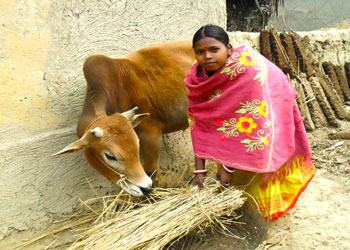Story and Photos by Heifer Bangladesh Staff
 Merina Tudu, 20, lives in Bangladesh's Holdibona village. She and her husband Rupen are parents to a 1 ½-year-old son. They had no land for cultivation and owned less than 1,000 square feet of land where they lived. It was very difficult for them to meet their daily living expenses with the little income Rupen brought home as a day laborer. Things were difficult for the family, and sometimes Rupen resorted to physically abusing his wife.
Merina Tudu, 20, lives in Bangladesh's Holdibona village. She and her husband Rupen are parents to a 1 ½-year-old son. They had no land for cultivation and owned less than 1,000 square feet of land where they lived. It was very difficult for them to meet their daily living expenses with the little income Rupen brought home as a day laborer. Things were difficult for the family, and sometimes Rupen resorted to physically abusing his wife.
When the idea of the Heifer project came up, Rupen was not interested in letting his wife be involved. He thought of the Heifer project activities as loan programs like those of other community development organizations working in the area.
In 2009, Merina and Rupen joined the Heifer project and received training on Heifer’s 12 Cornerstones for Just and Sustainable Development, which dramatically changed Rupen’s thinking in a very positive way. He said, “I never think of NGO activities like this. The training is about our daily life. We all should practice the Heifer Cornerstones in our life very effectively.”
Later, Merina received training on gender and justice, and improved animal and resource management. She received a cow, rice seed and tree saplings from the project in 2010 and carefully used these resources as she equipped herself with the necessary knowledge from the trainings.
In 2011, her cow gave birth to a calf, which grew into a strong bull with a market value of 20,000 takas, or about $255. She sold a small amount of milk and used the rest for her family. “It was my important source of nutritious food as I was not able to buy nutritious food regularly," she said.
Merina is an active member of the Mitjamak Nari Unnayan Samitte self-help group and practices the Cornerstones in her daily life. She has already passed on gifts to other group members and is very happy to pass on other gifts like curry, milk and vegetables. Her husband now cooperates in the household work and consults her when undertaking any decision. In turn, she shares everything regarding their family matters with her husband. They are living together happily, and have future plans, including allowing their son to be educated at a higher level.